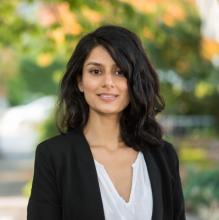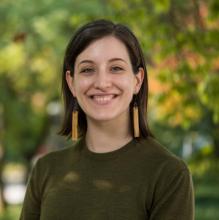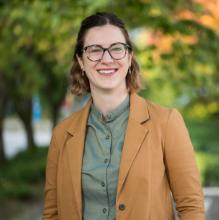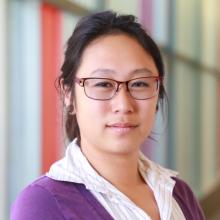Employing methods from the feminist de-colonial toolbox, such as participatory mapping, photovoice, and focus group discussions, will allow me to produce the rigorous scholarship expected by PSI, UBC and IRES, but also to de-centre myself somewhat as a researcher, to step back and allow for the amplification of the voices of those often invisibilized.
Research Description
The overall aim of my doctoral research is to utilize a mixed-methods approach in exploring women’s experiences of small water enterprise (SWE) projects designed to augment their empowerment in underserved sites in Ghana. The part of my research specific to PSI seeks to involve the voices of women not often meaningfully consulted in water development projects and frequently excluded as knowledge producers in academic research. Through my conversations and research inquiries into water development organizations in Ghana, it is clear that although ‘empowering women’ is often sought through their water projects, how and whether this might happen is less well understood. Employing methods from the feminist de-colonial toolbox, such as participatory mapping, photovoice, and focus group discussions, will allow me to produce the rigorous scholarship expected by PSI, UBC and IRES, but also to de-centre myself somewhat as a researcher, to step back and allow for the amplification of the voices of those often invisibilized. In producing maps and photographs created by participants, and in creating the space to allow for them to discuss their meanings with NGO partners and other decision-makers, it is my hope that the production of scholarship will meet the amplification of women’s voices in a way useful for both. Further, the digital and textual stories told through this project will, with participants’ permission, be incorporated into the Women, Water, Work / Living Waters Museum digital exhibition in further including and prioritizing the voices of women often most marginalized in their communities – those without access to formal education. As said well by Laurian Bowles, “What stories and photographs do offer […] is a self-generative analysis of women’s lives that are not often articulated or imagined”. Allowing these self-generative analyses to inform the work of local and international NGOs may serve to shift their methods of engagement with women in water projects, moving beyond tokenistic ‘participation’, while providing a platform for women to communicate their own strengths and concerns around water.
What does being a Public Scholar mean to you?
Being a public scholar, for me, means being able to integrate community-based work, relationships, and partnerships into my PhD work and having the support system (and cheerleaders) to do so. Public scholarship seeks to meaningfully engage with people not often included in the academic knowledge production system, or in the dissemination of that knowledge. So much of what is produced in academia never reaches the vast majority of people, even those who might be interested in the topic of your work! Joining an incredible group of public scholars means having the opportunity not only to produce public work, but to hear about the work of others, and to find new and innovative ways of having my own work live an extended life.
In what ways do you think the PhD experience can be re-imagined with the Public Scholars Initiative?
I think the Public Scholars Initiative helps students imagine other ways their work can be disseminated, impactful, and meaningful beyond and in the process of completing their PhDs. Not all work needs to lead to a paradigm shift or to global change, and most of it doesn’t, but with the PSI we can seek to pull academic work off the shelf and out of “the academy” and place it into the hands of anyone who might be interested in, or engaged with, the topic at hand. For students who want their work to contribute to some change in the world, incremental or otherwise, the PSI offers the support and encouragement necessary to making this possible.
How do you envision connecting your PhD work with broader career possibilities?
I hope to continue working in the water development sphere well beyond the completion of my PhD. Doing this work allows me not only to engage deeply with issues around water (in)security and governance, and the gendered aspects thereof, but to build relationships and connections with aligned organizations. I have long held the dual, and at times conflicting, positions of wanting to engage in international development work, while remaining highly critical of ‘development’ as a concept and a practice. Embedding practices informed by feminist research methodologies, ethical community-led development work, and critical development scholarship in my PhD will, I hope, be a thread I continue to weave through my future work in this field.
How does your research engage with the larger community and social partners?
Because my work takes place in a context not my own, building relationships and partnerships with local water organizations and NGOs in Ghana is of paramount importance. My work would not be possible without community partners, and it is critical that my goals align with the organizational priorities of those with whom I seek to work. Some of these organizations have already expressed a desire and need to better understand the social and gendered impacts of their work – a gap I hope to contribute to filling!
Why did you decide to pursue a graduate degree?
I decided to enter a PhD program for reasons both practical and passionate. My previous academic work has had gender and female empowerment woven throughout, although housed within the disciplines of psychology and sociology. Underlying many of the relationships and paths to what we might call empowerment are access to the basic fundamentals of life. Having worked on and studied a girls' empowerment program in my bachelor's degree, to studying the effects of gender norms on girls' access to education in my master's, led me to consider gender and the world of water in my doctorate. My passion for the betterment of the female experience met a practical desire to gain important critical thinking and analytical skills through the interdisciplinary program offered by IRES at UBC.
Why did you choose to come to British Columbia and study at UBC?
I completed my bachelor's degree at UBC in 2014 before taking a number of years off prior to entering McGill for my master's. I returned to UBC because my supervisor here studies the precise intersection of gender and water in which I am interested, and because Vancouver has become home over the 10+ years I've lived here.
What is it specifically, that your program offers, that attracted you?
The interdisciplinary nature of IRES is, for me, one of its most attractive qualities. IRES encourages problem-focused study with a focus on applicability to real-world issues. It merges both the social and natural sciences and allowed me to study the hydrosocial rather than the hydrological cycle. Both of my previous degrees were disciplinary in nature, and the freedom of perspective offered by IRES was one of the main features to which I was initially attracted.
For you, what was the best surprise about graduate life, about UBC or life in Vancouver?
I have lived here for over 10 years, so there is not much surprising at this point. However, having lived away for a year, I gained a new appreciation for Vancouver's incredibly accessible outdoor world.
What aspects of your life or career before now have best prepared you for your UBC graduate program?
I worked for a long time in between high school and starting university, and again in between my bachelor's and master's degrees. Working in a professional environment trained me (in many things) but, importantly for graduate school, time management, and setting a schedule!
What do you like to do for fun or relaxation?
I love biking in Vancouver and am just returning to ocean water rowing!
Do you have any tips for students from your home country coming to Canada / to UBC Grad School?
I think most people who apply to and end up in graduate school are over-achievers. My advice would be to release the idea of perfection if it is something to which you have traditionally been attached. Everyone sounds like they know exactly what they are studying and exactly how they are going to execute their project, but they have more likely just perfected their "elevator pitch" in the beginning. There is a lot of imposter syndrome in graduate school. We are all really just ducks, I think—it looks smooth on top, but we are furiously paddling underneath to figure out what we are going to do, and more importantly, how we are going to do it.
Public scholarship seeks to meaningfully engage with people not often included in the academic knowledge production system, or in the dissemination of that knowledge. Being a public scholar, for me, means being able to integrate community-based work, relationships, and partnerships into my PhD work and having the support system (and cheerleaders) to do so.




